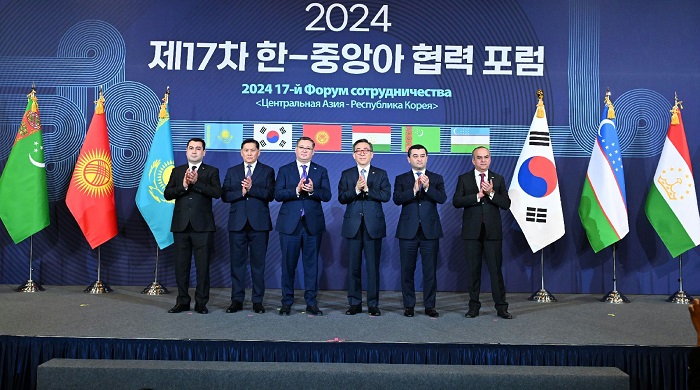On Monday, 4 November, the 17th Central Asia-Republic of Korea Cooperation Forum was held under the chairmanship of South Korean Foreign Minister Cho Tae-yul, which was attended by foreign ministers, deputy foreign ministers and chief delegates from five Central Asian countries: Kazakhstan, Kyrgyzstan, Tajikistan, Turkmenistan and Uzbekistan, according to Korean news outlets.
The Forum was attended by about 300 people, including government delegations from five countries of Korea and Central Asia, businessmen and private experts. This year’s forum, which has been held annually since 2007, was the first event since the administration of Korean President Yoon Suk Yeol launched its K-Silk Road initiative in June, the first comprehensive diplomatic strategy of South Korea aimed specifically at strengthening ties with Central Asia.
During the meeting, Minister Cho stressed that this forum will become an important platform for South Korea and the five Central Asian countries to finalize key projects and clarify the topics on the agenda of the first Korean-Central Asian Summit to be held next year in South Korea.
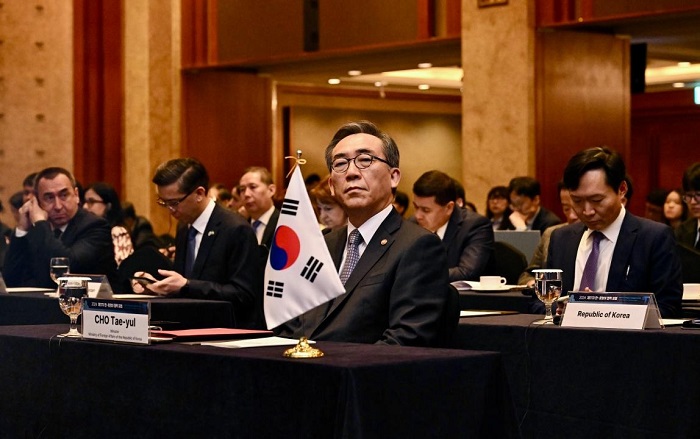 “We strive to raise the mutually beneficial partnership between Korea and Central Asia to a higher level,” Cho told the meeting participants. “To this end, we plan to hold the first Korea-Central Asia summit in Korea next year, which will mark the first step in the implementation of the K-Silk Road Silk Road cooperation initiative. In this sense, this forum is more important than ever before.”
“We strive to raise the mutually beneficial partnership between Korea and Central Asia to a higher level,” Cho told the meeting participants. “To this end, we plan to hold the first Korea-Central Asia summit in Korea next year, which will mark the first step in the implementation of the K-Silk Road Silk Road cooperation initiative. In this sense, this forum is more important than ever before.”
The key topics of the forum in Seoul were transport and logistics cooperation, energy cooperation, digital transformation and issues on the environmental agenda. Cho called these sectors as areas with high demand for cooperation that will contribute to the effective implementation of the K-Silk Road initiative.
Cho expressed hope that in the context of the worsening geopolitical situation and the supply chain crisis, cooperation in key areas of the mineral supply chain, agreed upon during President Yoon’s state visit to Uzbekistan and Kazakhstan last June, can be expanded to the entire five Central Asian countries. In addition, Tajikistan has recently completed the internal procedure for joining the Global Institute for Green Growth (GGGI). Thus, the creation of a common framework for international cooperation in the field of environmental protection has been completed by joining all five Central Asian countries to the GGGI.
In addition, the Korean Foreign Minister stressed that in the era of digital development, Korea and Central Asia should come up with ways to overcome the digital gap and enjoy the benefits together, such as supporting digital transformation. On the other hand, tourism is a promising field with a large potential for cooperation, and in recent years, the increase in direct routes connecting the region with Korea has enabled human and material exchanges. The Minister expressed hope that cooperation in the field of tourism, including the launch of joint tourism products, will become more active.
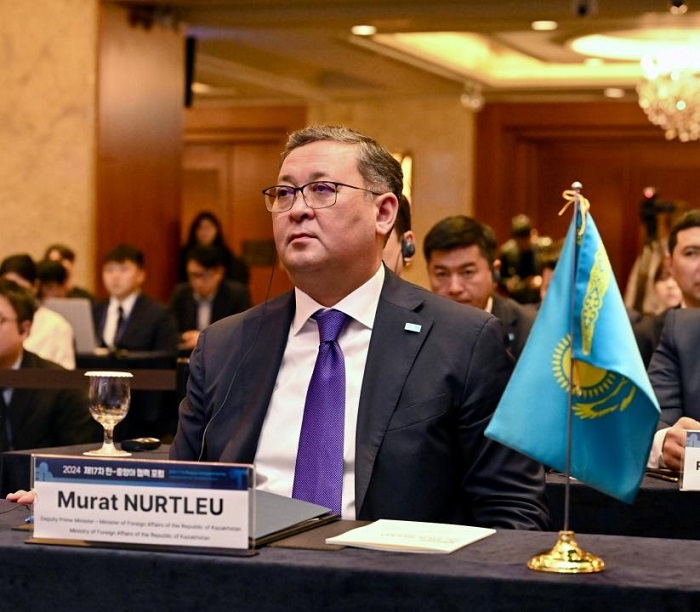 In turn, speaking at the forum, Deputy Prime Minister and Minister of Foreign Affairs of Kazakhstan Murat Nutrleu stressed the importance of transport connectivity for sustainable economic development of the region. He called on Korean companies to participate in the implementation of major projects to further expand the capacity of the Trans–Caspian International Transport Route and noted that in 2025 it is planned to increase it to 10 million tons per year. “Central Asia is becoming an important logistics hub capable of connecting Asia and Europe through Kazakhstan,” M. Nurtleu stressed.
In turn, speaking at the forum, Deputy Prime Minister and Minister of Foreign Affairs of Kazakhstan Murat Nutrleu stressed the importance of transport connectivity for sustainable economic development of the region. He called on Korean companies to participate in the implementation of major projects to further expand the capacity of the Trans–Caspian International Transport Route and noted that in 2025 it is planned to increase it to 10 million tons per year. “Central Asia is becoming an important logistics hub capable of connecting Asia and Europe through Kazakhstan,” M. Nurtleu stressed.
According to the Minister of Foreign Affairs of Uzbekistan Bakhtiyor Saidov, the decision to hold the first Korean-Central Asian summit in Seoul in 2025 is a convincing evidence of the commitment of the countries to promote a new stage of partnership in the name of common prosperity.
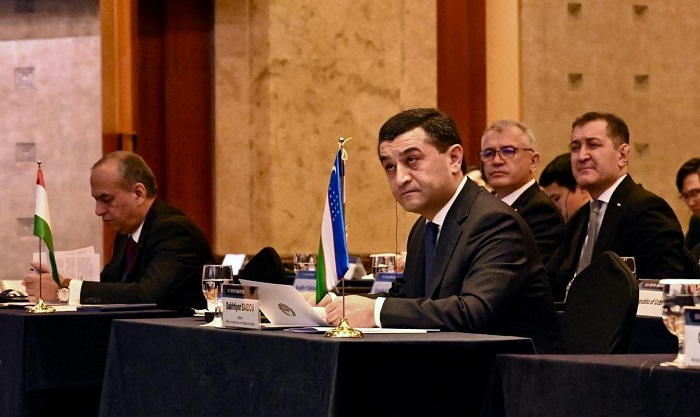 He emphasized that combining the dynamic potential of Central Asia with Korea’s strengths can create powerful synergies for mutual economic growth. Cooperation between Korea and Central Asian countries offers a vital opportunity to unlock market potential, increase investment and consumption, and create new jobs.
He emphasized that combining the dynamic potential of Central Asia with Korea’s strengths can create powerful synergies for mutual economic growth. Cooperation between Korea and Central Asian countries offers a vital opportunity to unlock market potential, increase investment and consumption, and create new jobs.
The First Deputy Minister of Foreign Affairs of Kyrgyzstan, Asein Isaev, announced his government’s proposal to consider the possibility of creating a special economic dialogue at the level of deputy ministers between South Korea and Central Asian countries, highlighting the need for a platform for consistent discussions to address shared challenges, exchange best practices and coordinate new directions for mutually beneficial economic cooperation.
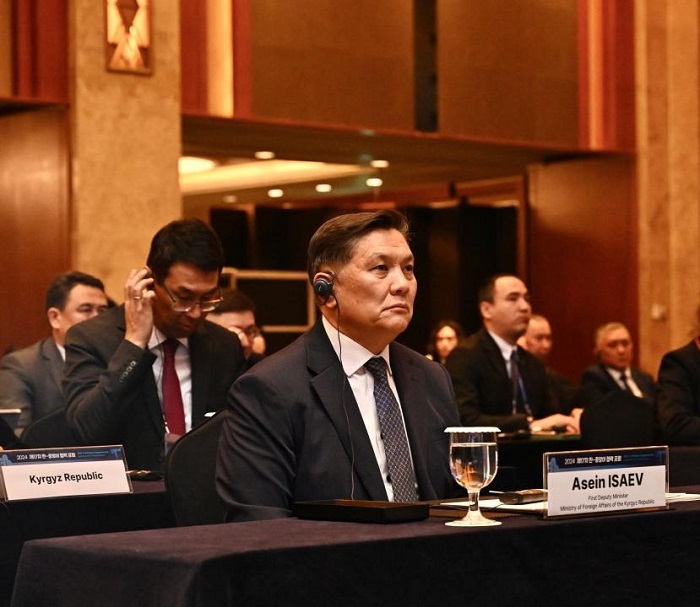 In their speeches, Deputy Minister of Foreign Affairs of Tajikistan Imomi Sodik Ashurboizoda and Ambassador of Turkmenistan to Korea Begench Durdyev pointed out the importance of mutually beneficial cooperation.
In their speeches, Deputy Minister of Foreign Affairs of Tajikistan Imomi Sodik Ashurboizoda and Ambassador of Turkmenistan to Korea Begench Durdyev pointed out the importance of mutually beneficial cooperation.
“If the experience and innovative technologies of Korea are applied in the mining, textile and food industries of Tajikistan, this will not only increase production efficiency, but also allow Tajikistan to integrate into global supply chains,” Ashurboyzoda believes.
Durdyev stressed “the importance of joining efforts in all promising areas where cooperation between Korea and Central Asia is necessary.”
“Our partnership should develop with careful consideration of the interests and potential of each country,” he said.
Following the meeting, a Joint Statement of the Ministers of Foreign Affairs and the Work Plan of the Secretariat of the Central Asia-Republic of Korea Cooperation Forum for 2025 were adopted.

